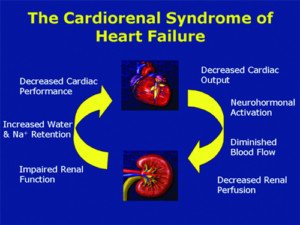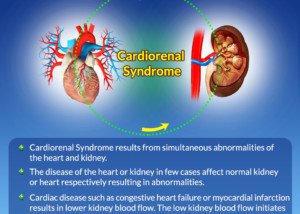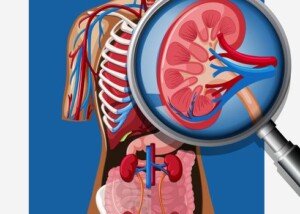
Cardiorenal failure is a classic chicken-or-egg scenario, in that it’s not always clear-cut which came first: heart failure or kidney failure.
• If the kidneys don’t receive enough blood from the heart, they will be negatively impacted.
• And if kidney function is poor, this adversely affects the heart, since well-working kidneys keep the blood clear of toxins.
In cardiorenal syndrome, which may as well be called renal-cardio syndrome, there is a vicious loop involving worsening cardiac function … causing worsening kidney function … causing worsening heart function.
Or – is it worsening kidneys … causing damage to the heart … causing worsening kidneys?
The name “cardiorenal” infers to the layperson that the process always begins with the heart.
But then again…”cardiorenal” may have been chosen by the medical establishment simply because it rolls off the tongue better than does “renal-cardio.”
Cardiorenal or Renal-Cardio?
“Academic doctors have made the term ‘cardiorenal syndrome’ both common and extremely difficult to understand,” says Roger Mills, MD, cardiologist and former professor of medicine, University of Florida, and author of “240 Beats per Minute. Life with an Unruly Heart”

Dr. Mills explains, “Over the past few years, five different types of cardiorenal syndrome have been described, and that classification is generally accepted in the medical world. I would like to simplify it for the majority of lay readers.
“The short answer to the question is, The cardiorenal syndrome is a package deal; heart and kidney problems most frequently come together.
“And the term ‘failure’ is not an absolute. The heart still pumps and the kidneys still make urine, but they are not doing either function well enough to maintain good health, particularly if the patient has the additional stress of an added illness like pneumonia or a urinary tract infection.
“Cardiorenal syndrome indicates that both the heart (‘cardio’) and the kidneys (‘renal’) are not functioning properly.”
The name does not infer which organ began worsening first nor which one is more of the driving force in the crisis situation.
Three Processes to Cardiorenal Syndrome
Dr. Mills says, “There are three underlying processes that contribute to this, often with differences in timing and in various combinations.
“The heart may not be providing enough blood flow for the kidneys to carry out their normal filtering function.
“This can occur either rapidly, with an episode of what’s called acute decompensated heart failure, or over months, to years [chronic heart failure].
“The kidneys may be chronically damaged, often as a result of diabetes or high blood pressure.
“Kidney disease may cause fluid retention or high blood pressure, or both, and this excess loading may lead to heart failure.
“Many of the drugs used to treat heart failure (and also kidney disease) can cause modest abnormalities in kidney function tests.
“As I said earlier, most heart failure patients are over age 60, and many are in their 70s and 80s with longstanding high blood pressure and/or diabetes.
“Because of these comorbidities, about a third of all heart failure patients have some stage of chronic kidney disease (CKD).
“The range of so-called normal on standard kidney tests depends on a patient’s age and body size.
“Older frail female patients are particularly likely to have near-normal levels on routine kidney tests despite substantially reduced kidney function.”
Suggested reading: Takahama H, Kitakaze M. Pathophysiology of cardiorenal syndrome in patients with heart failure. Am J Physiol – Heart and Circulatory Physiology 2017; 313: H715-H721



























